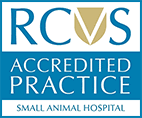Rabbit Haemorrhagic Disease - RHDV-2 - in Rabbits
Rabbit Haemorrhagic Disease (RHD) is a highly infectious disease of rabbits, and sadly often results in the death of affected rabbits.
It has been present in the UK since 1992 and we have been routinely vaccinating pet rabbits against this, along with Myxomatosis, for many years.
In 2014 a new strain of the disease, Rabbit Haemorrhagic Disease Virus – 2 (RHDV-2), was discovered and has been spreading throughout the country.
How would I know if my rabbit has the disease?
Unfortunately in most cases, death is sudden and your rabbit could be found dead before any signs are shown.
There is no easy test for RHDV-2, so a diagnosis is generally made based on symptoms.
Unfortunately illness can often develop very quickly and rabbits can be very unwell by the time their owner notices something is wrong.
Rabbits may be quiet and lethargic, or you may see bleeding - perhaps from the nose or in urine. Over time liver failure can occur too.
If you are concerned your rabbit is unwell, please call us and we can see you as soon as possible.
Sadly, as RHDV-2 can act very quickly, sometimes it can result in the sudden death of a rabbit which had otherwise appeared to be very healthy.
Is there any treatment?
There is no specific treatment for RHDV-2 so we give supportive treatment such as fluids, and assist with feeding if necessary.
We also make sure we maintain the rabbit’s temperature. We also wear protective clothing to make sure we don’t spread the virus.
How is the virus spread?
RHDV-2 is highly contagious and therefore spreads very easily.
It can be passed from one rabbit to another via contaminated food and water bowls as well as bedding (including hay and straw).
Flies and other insects, as well as wild animals, can also spread the virus.
What can I do to prevent my rabbits catching the virus?
The most effective way is getting your rabbit vaccinated.
There is a separate vaccine against RHDV-2, which needs to be given at a different time to the ‘normal’ RHD and Myxomatosis vaccine, a minimum of 2 weeks apart.
If you get a new rabbit, it might be prudent to keep him or her apart from any existing rabbits for 2 months to ensure they don’t bring the virus into your household.
Also, avoid picking any wild plants to feed to your rabbit, in case they have been contaminated.
Vaccination Clinic - Thursday 12 March 2018
It's very important to protect your rabbits against this life threatening new disease - and we are also all very keen to avoid a national epidemic.
This vaccination has a short expiry time, so we are planning to run a Vaccination Clinic for Rabbits on Thursday 12 March 2018, (provided there is sufficient demand).
You will have the opportunity for a full health check plus the vaccination, at a reduced price of £34.
To Register your Interest in this Vaccination and in the Clinic, Please Call Us on 01905 355938 as soon as possible.








